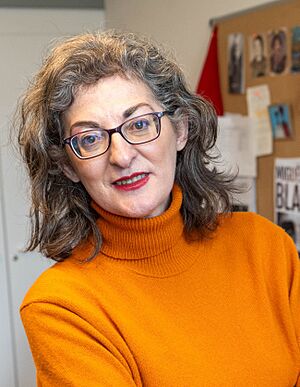Maite Pagazaurtundúa facts for kids
Quick facts for kids
Maite Pagazaurtundúa
|
|
|---|---|

Maite Pagazaurtundúa (MEP)
|
|
| Member of the European Parliament | |
| In office 1 July 2014 – 15 July 2024 |
|
| Constituency | Spain |
| Personal details | |
| Born | 11 February 1965 Hernani, Guipúzcoa, Francoist Spain |
| Political party | Spanish Socialist Workers' Party (1993–2005) Union, Progress and Democracy (2014–2020) Independent (linked to Citizens from 2020) |
| Occupation | Politician |
| Awards | Sakharov Prize (2000) Order of Constitutional Merit (2003) |
María Teresa "Maite" Pagazaurtundúa Ruiz, also known as Maite Pagaza, is a Spanish politician, activist, and writer. For ten years, she served as a Member of the European Parliament (MEP), representing Spain. In the European Parliament, she was part of political groups like Renew Europe and the ALDE.
Her work has focused on defending the Rule of Law, which means everyone must follow the law, including the government. She also fights for basic human rights and stands against terrorism and disinformation that tries to harm democracies.
Contents
Early Life and Family
Maite was born in Hernani, Spain, in 1965. Her family faced many challenges. Her mother, Pilar Ruiz, was a war refugee. Maite's brother, Joseba Pagazaurtundúa, was tragically killed by the terrorist group ETA in 2003. This event deeply shaped Maite's life and work, inspiring her to fight for freedom and peace.
She studied at the University of Deusto and the UPV. Because of her political beliefs, she faced threats and had to stop attending classes in person for her safety. For 13 years, she had to live with police protection. In 2007, she and her family moved out of the Basque Country for their safety. She is married and has two daughters.
Standing Up for Freedom
Maite has been involved in many social movements to protect civil liberties in Spain and other countries. She is known for her brave stand against terrorism and hate speech.
In 1998, she helped create ¡Basta Ya! (which means "Enough is Enough!"). This group brought together people from different backgrounds to oppose terrorism, support its victims, and defend the Spanish Constitution. The group used new and creative ways to spread its message, like holding demonstrations and publishing an online magazine.
In 2000, the European Parliament awarded ¡Basta Ya! the prestigious Sakharov Prize for Human Rights. It was the first time a European citizens' group received this award.
Political Career
Maite's political journey began in the Basque Country. She later took her work to the European level.
Basque Parliament and Local Government
From 1993 to 1998, Maite was a member of the Basque Parliament. She worked on committees for human rights, education, and culture. She also served as a town councilwoman in Urnieta from 1999 to 2007.
Over time, she had disagreements with her political party, the PSOE, about its policies. This led her to eventually leave the party and join other political movements.
Member of the European Parliament (MEP)
From 2014 to 2024, Maite was an active MEP in Brussels. She worked with different political parties, including UPyD and Ciudadanos, to continue her mission.
As an MEP, she focused on:
- Protecting Citizens' Rights: She worked to make sure all EU citizens could fully enjoy their rights and freedoms.
- Fighting Terrorism: She was part of special committees on terrorism, helping to find ways to keep Europe safe.
- Defending the Rule of Law: She spoke out to protect the justice system in Spain from political pressure.
- Investigating Foreign Interference: She helped uncover how other countries, like Russia, were trying to interfere with politics in Spain, especially in the region of Catalonia.
She was also a member of the Committee on Petitions, where European citizens can report problems. She led investigations into important issues, such as unsolved ETA murders and the protection of children's rights.
Important Initiatives
The Foundation for Victims of Terrorism
From 2005 to 2012, Maite was the president of the Foundation for Victims of Terrorism. During her time there, she helped publish a book called Vidas Rotas (Broken Lives), which told the stories of every person killed by ETA. This work helped bring attention to hundreds of unsolved cases.
Joseba's Mailbox
In 2015, on the anniversary of her brother's death, Maite's family placed a white mailbox next to a memorial sculpture for Joseba. The mailbox was an invitation for people in the town to share their feelings and take responsibility for the climate of hate that had existed. Many people, including famous writers like Mario Vargas Llosa, sent letters of support. The mailbox became a powerful symbol of memory and healing.
Writer and Speaker
Maite has written several books and articles for newspapers. Her books often explore her family's story, politics, and society.
- Los Pagaza. Historia de una familia vasca (2004): A book about her family's story and her brother's life.
- El viudo sensible y otros secretos (2005): A collection of short stories.
- Aralda (2010)
- Operación Cochinillo (2014): A satirical book about corruption.
- Lluvia de fango (2016): A collection of her articles.
She has also given talks at many universities and centers, sharing her knowledge on politics and human rights.
Awards and Recognition
Maite's work has been honored with many awards:
- Sakharov Prize (2000): As a member of ¡Basta Ya!
- Medal of the Order of Constitutional Merit (2003): For her defense of the Spanish Constitution.
- Henneo Award (2018): For her defense of freedom and human rights.
- Tolerance Award (2018): For promoting tolerance and understanding.
Images for kids
See also
 In Spanish: Maite Pagazaurtundúa para niños
In Spanish: Maite Pagazaurtundúa para niños


